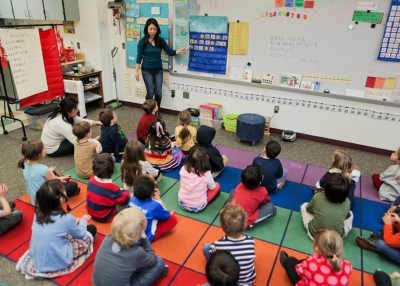Common Core and More

Prepare students for the global knowledge economy, and meet and exceed the Common Core State Standards along the way.
The Common Core State Standards (CCSS) are designed to prepare students for the global economy. They reflect the knowledge and skills students need for college and the interconnected world beyond.
Does the Common Core build student global competency? Certainly that’s the intention. But are they the same as Asia Society’s global learning system?
Asia Society’s global learning system, like the Common Core, is all about college and career readiness. But Asia Society’s system has something that the Common Core does not: that of agency.
Asia Society students analyze and interpret information, then adopt a position of advocacy or action. The skills required for successful participation in the world—such as responsible citizenship, innovative entrepreneurship, and active leadership among others—may involve starting service projects, spreading knowledge or ideas, volunteering time, and so forth.
Agency is something most people develop independently, if at all, and it is difficult to teach. In an Asia Society school, students are required to demonstrate this critical strategy repeatedly. They demonstrate increasing levels of mastery throughout their educations, thereby equipping them with a critical key to success in college and careers.
Asia Society’s global learning system therefore meets and exceeds the outcomes outlined in the Common Core State Standards.
The Research
The Educational Policy Improvement Center (EPIC) just released an analysis of how the Common Core State Standards relate to the outcomes of Asia Society Graduation Performance System (GPS).
In a three-part study, EPIC examined the graduation performance outcomes in six subject areas (English language arts, math, science, history/social studies, world languages, and arts) and the cross-cutting Global Leadership Performance Outcomes.
The study found that all of the CCSS ELA Anchor Standards and the CCSS Standards for Mathematical Practice are addressed by the GPS performance outcomes in ELA and math.
- All CCSS ELA Anchor Standards are related to at least three of the ELA Asia Society Performance Outcome domains (Investigate the World, Recognize Perspectives, Communicate Ideas).
- All CCSS Standards for Mathematical Practice are related to at least two of the Math Asia Society Performance Outcome domains (Investigate the World and Communicate Ideas).
- Students who master the Asia Society’s performance outcomes in ELA and Math would be expected to significantly increase mastery of the CCSS.
The investigation found that the primary difference between the two standard systems is in the “Take Action” dimension of the Asia Society performance outcomes. Overall, the CCSS inconsistently address the ability of students to reflect on their learning and to develop a position of advocacy or action. This study indicates that the knowledge and skills necessary for college and career success are addressed by the Asia Society Performance Outcomes, but the Asia Society Performance Outcomes add an activist dimension not present in the Common Core State Standards.
In addition, the GPS POs are also aligned to two aspects of College and Career Readiness: Key Content Knowledge (where content knowledge is defined by the CCSS) and Key Cognitive Strategies. The strong degree of alignment with the Interpretation aspect of the Key Cognitive Strategies is especially significant for preparing students to analyze and evaluate information necessary for both understanding global issues and preparing for college-level work. Interpretation is not a strategy that most students develop independently, and it is also difficult to teach. Students learning under the Asia Society Graduation Performance System will be required to demonstrate this critical strategy repeatedly and to show increasing levels of mastery throughout their educations, thereby equipping them with a critical key to success in college and careers.
In conclusion, a curriculum based on the GPS performance outcomes couples rich content acquisition with intentional behaviors that allow students to develop a cognitive framework that enables them to be successful in school as well as in the world outside of school.
See the full reports:
- Asia Society Performance Outcomes and the Common Core State Standards: Areas of Greatest Alignment in Math
- Asia Society Performance Outcomes and the Common Core State Standards: Areas of Greatest Alignment in English Language Arts
The Common Core State Standards provide a consistent, clear understanding of what students are expected to learn, so teachers and parents know what they need to do to help them. The standards are designed to be robust and relevant to the real world, reflecting the knowledge and skills that our young people need for success in college and careers. With American students fully prepared for the future, our communities will be best positioned to compete successfully in the global economy.





